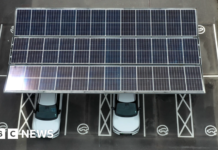To prevent the worst impacts of global heating, we need a whole suite of policy changes. Of them, making carbon pricing predictable is by far the most effective one we know of. Carbon pricing is the most silver bullet-ish policy available.
It’s Silver Bullet-ish
En-ROADS is a transparent, freely-available policy simulation model that provides us with the ability to explore, for ourselves, how various climate solutions would affect outcomes such as global temperature change. The goal in making the model is to frame and support better conversations about how to address the climate crisis. On April 30, 2020, Doug Pritchard of CCL Beaches-East York, Chemical Engineer, and En-ROADS Climate Ambassador led CCL Canada on a tour of the En-ROADS climate solutions simulator.
Impact of 1.2°C of Warming
On June 11, 2020, it was estimated in the En-ROADS simulator that just implementing a highly predictable carbon price would prevent 1.2 °C of global heating by 2100 compared to business as usual. Changing any other single policy in the simulator could prevent up to 0.5°C of global heating by 2100. This makes implementing a highly predictable carbon price by far the most impactful single policy change in preventing global temperature increase in the simulator.
Even if all the signatories to the Paris Agreement reach their respective 2030 emissions-reduction targets, the world would still be on a path to a 3-4°C of warming. Carbon pricing applied on a global basis in combination with progressive climate policy are needed to keep global heating well below 2°C as stipulated in Article 2.1.a of the Agreement.
(Note that this simulator is for the entire globe and not just for Canada.)
Source: CCL Laser Talk, June 2020
ICYMI:
Helping Our Politicians Solve The Climate Crisis
We Have Time To Act But We Don’t Have Time To Wait
This work is licensed under a Creative Commons Attribution-NonCommercial 4.0 International License.















The article says that carbon pricing applied on a global basis in combination with progressive climate policy are needed to keep global heating well below 2°C.
In other words, national carbon pricing programs (such as carbon fee-and-dividend as implemented here in Canada), while steps in the right direction, are not going to be adequate.
With billions of dollars at stake, the temptation for cheating by individual nations will be too great.
How to get there?
In many jurisdictions, major new taxes require approval by referendum. Using that as a precedent, global carbon pricing would require approval by a global referendum.
Such a decision-making process would help give the legitimacy that global carbon pricing would need to be universally accepted and continue for the length of time (decades if not centuries) needed.
In Switzerland, population 7 million, citizens can force major law changes to go to referendum by collecting 100,000 names. An equivalent number for a worldwide petition would be about 100 million names.
https://tinyurl.com/GlobalCarbonPetition
#GlobalCarbonFeeAndDividendPetition
Keith. Thank you for the feedback.
In a perfect world, the universal acceptance of a carbon pricing mechanism such as carbon fee and dividend would go a long way toward bending the curve on emissions. But we’re a long way from there, a very long way. It’s difficult to get consensus within one country with 10 provinces and 3 territories, let alone some 198 countries. That said, I do support your petition which I’ve signed.
I am very much in favor of a carbon tax. However, the current carbon tax bills are all too flawed in major ways. Here is an opinion piece (op-ed) I helped write with Physicians for Social Responsibility–Arizona Chapter. Since the time I helped write this, I have been alerted that the bill might be much worse than this. That is, the Clean Air Act (CAA) carbon regulation is terminated under the CCL-supported HR763 for 10 years. What makes this worse is that any — repeat any — associated particulate and chemical pollution that is in synch with the CO2 production (which is pretty much all of them) could be enjoined with CO2 regulation. All such regulation could be stripped from EPA authority. This would invalidate much of the CAA. And this would be even much worse than simply stripping the Environmental Protection Agency from enforcing the CO2 regulation of the CAA. Here’s the op-ed:
Global Warming Solutions Need to be Wisely Planned
From low to high impacts, humans are causing climate changes that affect our world.
Low impacts include simple comfort changes with more varying weather conditions. Medium impacts include more frequent adverse temperature records. High impacts include extreme temperatures combined with droughts, then sometimes also with power failures jeopardizing people who must be cool enough to stay alive. High impacts exacerbate wildfire and extreme weather events, create species loss, escalate diseases, and potentially cause societal collapse.
Over 60% of global warming is caused by the energy sector of our economy. Hence, urgent global warming solutions need to focus heavily on our energy sector.
Increasing energy efficiency offers the largest impact. Installing more renewable energy capacity and eliminating fossil fuels and nuclear capacity go a long way toward solving global warming. Improving our energy policy on city, county, state, national, regional, and global levels, are all critical measures.
One such policy that has a fairly high long-term potential is the establishment of a carbon tax, or a fee, on carbon pollution. For about ten years now, carbon tax bills have been winding their way slowly through committees of Congress. The bill that was recently touted in two opinion pieces in the Star is the U.S. House bill HR763, the Energy Innovation and Carbon Dividend Act of 2019.
But something went haywire with this carbon tax and dividend bill at the congressional committee level. This carbon tax option was corrupted by a proposed trade-off of one of our bedrock environmental protections, namely our Clean Air Act. Hence many are opposing a carbon tax that has gone awry, instead of promoting this high-potential option.
Physicians for Social Responsibility (PSR) opposes this bill. And the Sierra Club does not support HR763. Why? This is primarily because HR763 would trade away a vital part of the Clean Air Act. It would put Environmental Protection Agency pollution emissions regulation on hold for at least ten years. It would discard a critical tool to fight climate change. We need the Environmental Protection Agency to fully regulate air pollution, including excessive CO2 and other global warming gasses, under the Clean Air Act.
Just as importantly, HR763 would set a bad precedent by trading away an environmental law that protects public health. Coal and gas plants and gasoline-powered automobile emissions are notoriously known to cause life-threatening health problems. They cause asthma, chronic lung disease, cardiovascular disease, birth defects and much more. And they cause them most often in low-income and vulnerable multi-ethnic communities where these pollution sources are often located. We cannot afford to risk a cascade of subsequent health and environmental problems from trade-offs of our environmental laws.
Another problem with HR763 is that it promotes “carbon capture and sequestration” of gases from coal plant and gas plant emission stacks. This technology has been shown to actually require more mining of coal and gas. It is too environmentally damaging and expensive, and would actually set back solutions to global warming.
The courts have ruled that the EPA has the authority to regulate CO2, and some of the ways it could reduce CO2 emissions are:
Encouraging multi-state carbon tax arrangements;
Limiting emissions from coal and gas plants; and
Establishing and managing enforcement programs.
A well-planned carbon tax is a good thing. One that disables our environmental laws is not acceptable. Please ask your representative to oppose this bill. In southern Arizona, Congressional Representatives are Raul Grijalva and Ann Kirkpatrick.
You can contact either of them by going to: https://www.house.gov/representatives/find-your-representative.
Barbara H. Warren, MD, MPH
Director of Physicians for Social Responsibility
Thank you Russel for this elaborate response and feedback to the article.
While I don’t know all the details of HR763, I fail to see why it comes with a 10-year suspension of the Clean Air Act. Can you explain why that condition if part of the proposal.
By the way, an excellent OpEd by the Physicians for Social responsibility.
People ask, “what about China? What about India?” The US emits only 15% of global emissions, so we need to leverage our nation’s buying power to incentivize other nations’ lowered emissions. HR763 puts a price on carbon, which is great, but it also includes a Border Tax so ‘dirty energy’ heavy goods would be taxed at our border. This creates a strong incentive for exporting nations, like India and China to accelerate their transition to clean energy, or pay import taxes at our border.
Hello Jan and welcome to Below2C
Thank you for engaging discussion on Russel Lowes’ response.
First, HR763 leaves intact controls on pollutants other than CO2, such as sulfur and nitrogen oxides, mercury etc. Second, it is considered more effective and efficient than regulations, according to the En-Roads study above and the National Academy of Sciences. So what is being traded away? I think I read that it would reduce emissions 9x faster than the Clean Power Plan. Third, Trump has neutered the EPA, anyway as might other hostile administrations, so where is the hedge around the EPA? Fourth, when all fees are rebated and citizens get a monthly check (over and above higher costs for 2/3 of all citizens, especially the poorest) it would be difficult to neuter this bill later on.